Changes to citizenship law to help Malaysian mums with overseas-born children may worsen statelessness for others
The constitutional amendments proposed by the Malaysian government will affect abandoned children, foundlings, vulnerable children and children born to permanent residents of the country, a coalition of groups has claimed.
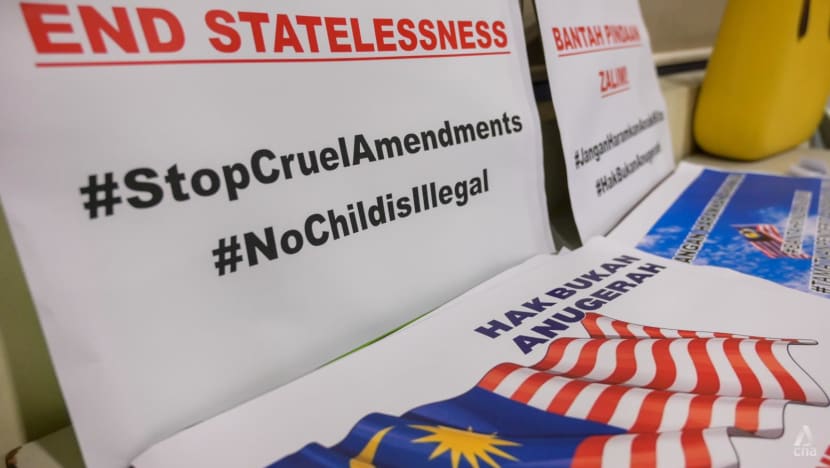
Banners and signs at a press conference in Kuala Lumpur on Nov 7, 2023. Rights groups have called for the Malaysian government to fulfill their promises to mothers of overseas-born children and withdraw certain amendment of the Federal Constitution on citizenship rights. (Photo: CNA/Fadza Ishak)

This audio is generated by an AI tool.
KUALA LUMPUR: When Mrs Esther Teo, 37, was heavily pregnant with her second child in Germany back in 2019, she decided to return home to Malaysia not long before she was due to give birth.
The reason: Mrs Teo, who is married to a German national, wanted her child to be granted automatic Malaysian citizenship - something that her elder daughter was not able to get as she was born in Germany.
While Malaysian fathers can confer automatic citizenship on their children born overseas, Malaysian mothers who have a foreign husband are not able to do so.
So, Mrs Teo hid her pregnancy from airport officials and took the risk of taking a long-haul flight back to Malaysia despite not getting clearance from her gynaecologist to travel.
“I did not get clearance from my doctor to travel so I opened my wardrobe and wore the biggest clothes I could find so that I could hide my pregnancy to get into the plane,” said Mrs Teo, who went to Germany in 2006 for her studies, before she started working and eventually got married there.
She, however, considers Malaysia to be home and has always wanted to come back.
“My home and family are all in Malaysia. This is where my roots are. I couldn’t afford to be there if my two daughters are without Malaysian citizenship,” she told CNA.
Mrs Teo, who quit her engineering job, said that she endured a difficult and stressful time in her marriage when she decided to leave Germany.
There is seemingly light at the end of the tunnel for Mrs Teo and her eldest daughter for the girl to obtain Malaysian citizenship.
Among other things, citizenship determines access to education, healthcare, and employment.
Under Malaysia’s Constitution, acquisition of citizenship can be obtained by way of verification of citizenship status by “operation of law”, by registration and by naturalisation.
Following a legal battle launched by mothers in Malaysia that is now in the Federal Court, the government has proposed several amendments to the Constitution that will grant Malaysian mothers equal rights to confer automatic citizenship on their overseas-born children, just like Malaysian fathers.
The Federal Court is the highest court of the land and is the final avenue for the case to be heard.
But at the same time, the government has also proposed five other amendments to Malaysia’s citizenship law that rights groups claim threaten to worsen statelessness in the country.
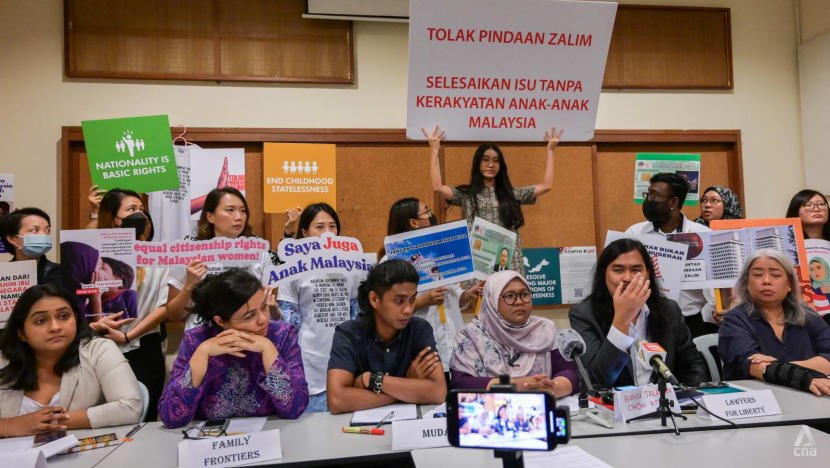
They support two amendments that are in favour of the Malaysian mothers but said that five of the other proposed amendments are “regressive”.
The groups have said that these amendments will affect abandoned children, foundlings, vulnerable children and children born to permanent residents of the country which they believe will “create a new class of stateless persons in Malaysia”.
“The amendments are not simply intended to ‘plug loopholes’ in the Constitution, they are intended to confer absolute discretion on the Home Minister and the National Registration Department, making it almost impossible to seek recourse if a person’s application for citizenship is rejected.
“The amendments attempt to legalise procedural hurdles that the authorities have arbitrarily had in place, some of which the courts have held to be unconstitutional and a violation of basic rights,” the Malaysian Citizenship Rights Alliance (MCRA) said in a statement on Nov 7.
The alliance is made up of four non-governmental organisations (NGOs) - Yayasan Chow Kit, Lawyers for Liberty (LFL), Development of Human Resources of Rural Areas (DHRRA) Malaysia and Family Frontiers - that work on issues of statelessness and citizenship among other things.
The alliance said that the government has yet to provide a clear reason as to why the changes to confer citizenship to children born overseas to Malaysian mothers can only move forward if combined with the other “restrictive amendments”.
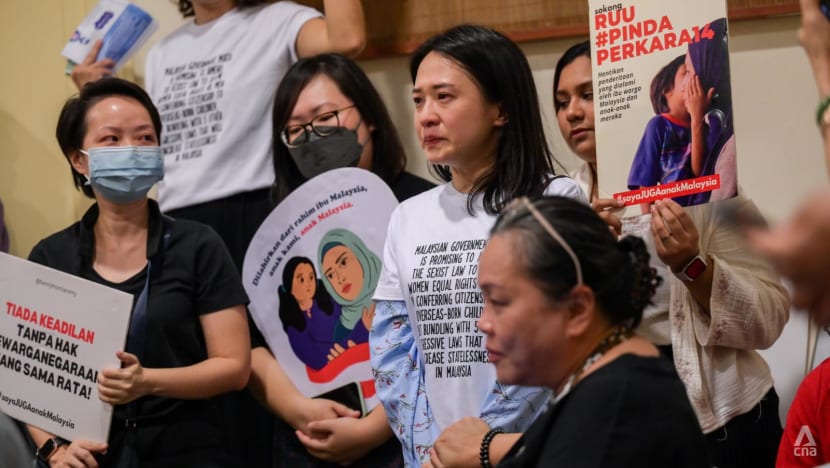
NOT AT THE EXPENSE OF OTHERS
Mrs Teo, who hails from Johor, has already applied for her eldest daughter’s citizenship but does not know the status of the application.
Her husband had quit his job in Germany to join the family in Malaysia, with Mrs Teo admitting that not every spouse would be as understanding as hers.
“It has been a traumatic experience,” she said, adding that her eldest daughter can currently only remain in Malaysia under a student pass.
Malaysia is one out of 25 countries that prevents women from conferring citizenship rights to their children born overseas on an equal basis as men.
A Malaysian mother must apply for her child’s citizenship and has to continue doing so if the application is rejected.
The High Court ruled in August 2021 that Malaysian mothers have equal rights to pass their citizenship to their overseas-born children, although the government won an appeal at the Court of Appeal a year later. The case is now in the Federal Court.
In their manifestos for the 15th general election in November last year, both Pakatan Harapan and Barisan Nasional - now partners in the unity government led by Prime Minister Anwar Ibrahim - pledged to amend the Federal Constitution to give mothers the same right.
Mrs Teo said that while she has been waiting anxiously for years for her eldest daughter to get Malaysian citizenship, she would not be proud nor happy if it came at the expense of foundlings and other vulnerable segments of society following the proposed changes to the law.
“Honestly, I cannot afford to not get citizenship for my daughter. It has been a (long) struggle … But foundlings and abandoned children do not have anyone to fight for them. These (proposed) amendments are not fair to them,” she told CNA.
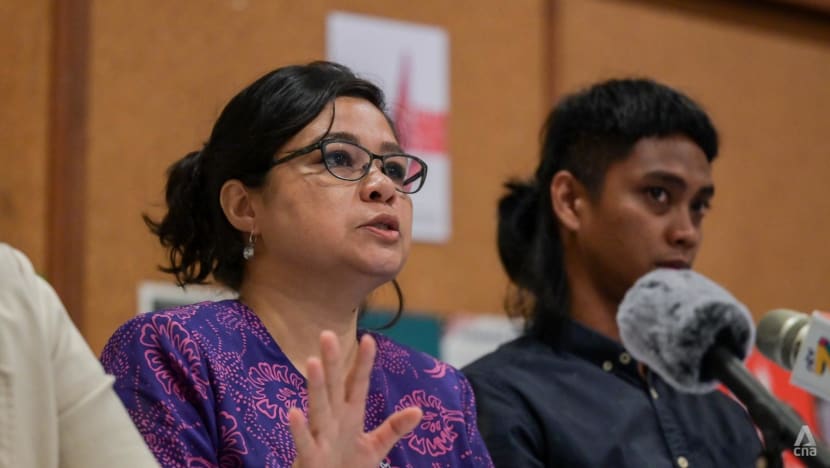
Ms Suriani Kempe, the president of Family Frontiers who is fighting the legal battle for the affected Malaysian mothers in court, said that the government’s move was a bitter pill to swallow as it turned children into commodities whose rights were tradable.
“What the government is saying is that children born overseas to (Malaysian) mothers will only be able to gain automatic citizenship at the expense of other vulnerable groups of children losing the citizenship rights they have now,” she told CNA.
Ms Kempe added that the amendments should be decoupled and that the proposed progressive changes to the law should be tabled alone without the regressive amendments.
“What the government is saying is ‘either-or’. It’s either the mothers get their rights and other vulnerable children lose their rights or it’s voted down and mothers don’t get their rights and it is status quo,” she added.
"CRUEL AMENDMENTS"
Mrs Maalini Ramalo, the director of DHRRA Malaysia, believed that the authorities wanted to make the amendments to the citizenship law following several successes by those impacted in court proceedings.
One of these cases was when the Federal Court rejected the government’s bid to stop the recognition of a stateless man as a Malaysian citizen in Oct 2022.
The High Court in 2019 had ruled in favour of Mr Wong Kueng Hui due to a clause in the Federal Constitution, with the Court of Appeal later upholding the decision.
The Federal Court later dismissed the government’s bid to appeal the decision.
The government has now proposed to remove the provision that ensures that persons born stateless in Malaysia such as Mr Wong will attain Malaysian citizenship by operation of law to citizenship by registration.
“Currently, vulnerable and affected individuals are afforded a pathway to citizenship through the existing provision, which is a safeguard against statelessness,” said Mrs Ramalo, adding that court processes are however very expensive.
She also said that children should not be made to pay for the mistakes of their parents.
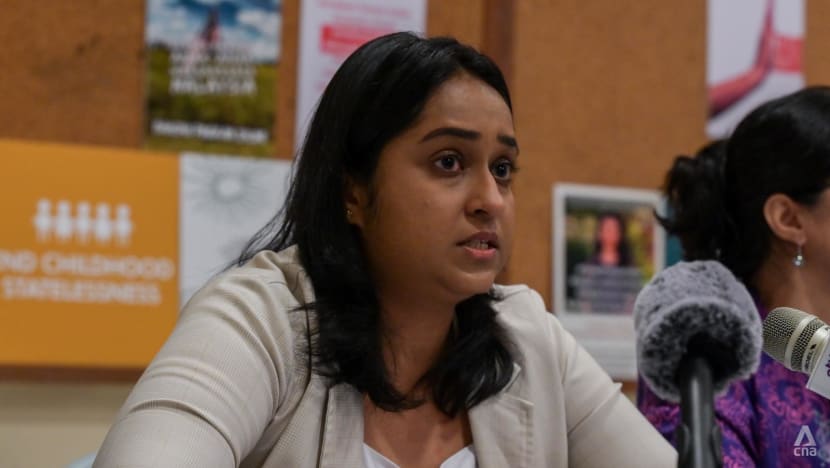
Mr Wong - now aged 28 - told CNA that he had waited 16 years to become a Malaysian citizen, including the five-year court battle to attain his citizenship and get an identity card (IC).
“These are cruel amendments, and I cannot agree with them. If the government goes ahead with these amendments, it will be harder for anyone like me to fight for justice in court,” he said, adding that he had applied for his IC since the age of 12.
In Malaysia, citizens first obtain their IC at the age of 12, and are later required to change to a new IC when they turn 18.
Mr Wong, who is now an advocate against statelessness, said that in the past, even buying a bus ticket to travel was difficult as buying one requires forms of identification, and thus had to depend on his friends to make the purchase for him.
He also had to carry his citizenship application everywhere he went as he did not own any form of identification.
“The authorities used to ask me for bribes because I couldn't produce any identification but because I knew my rights and had a support system, I could argue my case with them,” he alleged.
Similarly, 21-year-old actress Melissa Aurelia told CNA that the proposed amendments to the Constitution would make it even more difficult for those in a similar position to hers to attain citizenship.
“The amendment is cruel and will only make it worse for those who are stateless,” said Ms Aurelia, who is still fighting to gain Malaysian citizenship.
Ms Aurelia has a birth certificate but could not get her IC at the age of 12 after it was discovered that her father’s marriage to her Indonesian mother was not valid.
Malaysia is one of only two countries in the world - the other being Barbados - that discriminates against men in terms of their ability to pass their citizenship to their children born out of wedlock.
Ms Aurelia dropped out of school at the age of 14 and has worked countless number of jobs since, from selling food at stalls to working in retail shops before getting into the entertainment industry.
“It’s tougher than anyone who has an IC can imagine. I cannot open a bank account and I am scared to leave the house in case of a roadblock,” she said.
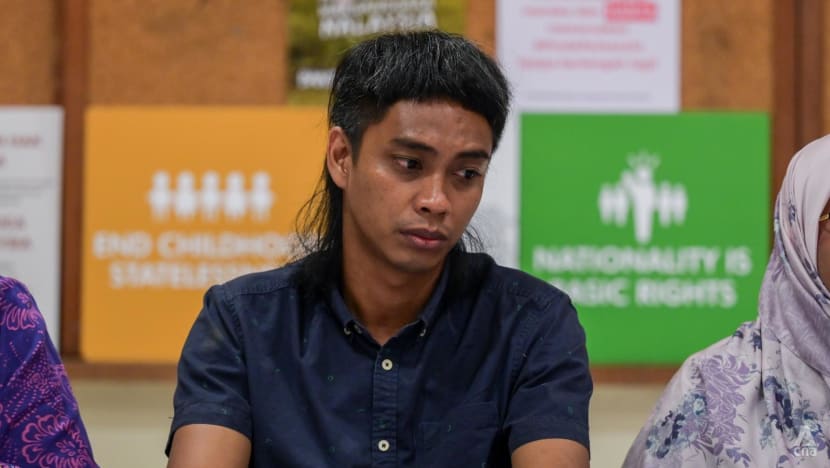
WHAT HAS THE GOVERNMENT SAID
Prime Minister Anwar Ibrahim told reporters on Nov 6 that the government has to incorporate the views of the Conference of Rulers on the planned constitutional amendments and that this would be explained to the backbenchers in parliament.
"We will inform them because this was presented to the Conference of Rulers. There is a limit on what we can do after discussions (with the rulers).
"Any constitutional amendment that affects the issue of citizenship has to be cleared with the Conference of Rulers. (The rulers) have taken a certain position and we will have to honour that,” he was quoted as saying by Malaysiakini.
Home Minister Saifuddin Nasution Ismail further reiterated the point about a week later that the Malaysian government would engage with both government and opposition backbenchers to explain the proposed amendments to the Constitution.
To be approved, any amendments to the Federal Constitution require a two-thirds majority support of members of parliament (MPs).
“We will engage all MPs to get their feedback. All of them because we want the best for this proposal," Mr Saifuddin said during a press conference on Nov 14.
Ipoh Timor MP Howard Lee of the Democratic Action Party (DAP) earlier this month hinted that there was unhappiness over the proposed amendments among some MPs. DAP is a component party within the Pakatan Harapan coalition.
“Reading just the room consisting of just our own guys, sent clear signals that the proposed amendments if hit the floor without decoupling; there will be some who are compelled to break whip in order not to break conscience. Think about it,” he said in a post on X on Nov 4.
Mr Lee’s social media post came after Mr Saifuddin had on Nov 1 told parliament that there would still be legal avenues for the stateless to pursue their citizenship by way of registration under the Federal Constitution.
“Let me give an analogy, say a Rohingya refugee mother marries an illegal migrant from Indonesia and a child is born out of their undocumented parents, constitutionally the child is a citizen by operation of law.
“So, we agree to that recommendation, we say that the child needs to be registered by the Welfare Department first and a subsequent application for citizenship will be submitted by the department.
“There needs to be elements of investigation, checks, so by operation of law there is still room for them to register as citizens, this is what some of the NGOs are finding it hard to accept,” he was quoted as saying by Malay Mail.
Mr Saifuddin also told The Star last week that there were 150,000 cases of statelessness on his table and that he had approved 11,000 citizenship for the stateless in the past 11 months.
CNA has reached out to Mr Saifuddin and the Home Ministry for more comments on the issue.
Ultimately, Mr Wong - the Malaysian citizen who was formerly stateless - hopes the affected mothers with overseas-born children would get their wish via the two amendments in the Constitution without the other five proposed changes being passed.
He would also like to see reforms in the National Registration Department, which is responsible for processing citizenship applications.
“All I would like for them is to follow the Constitution and make it easier for the cycle of childhood statelessness to be broken,” said Mr Wong.


















